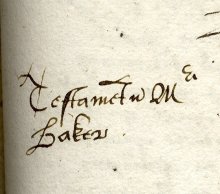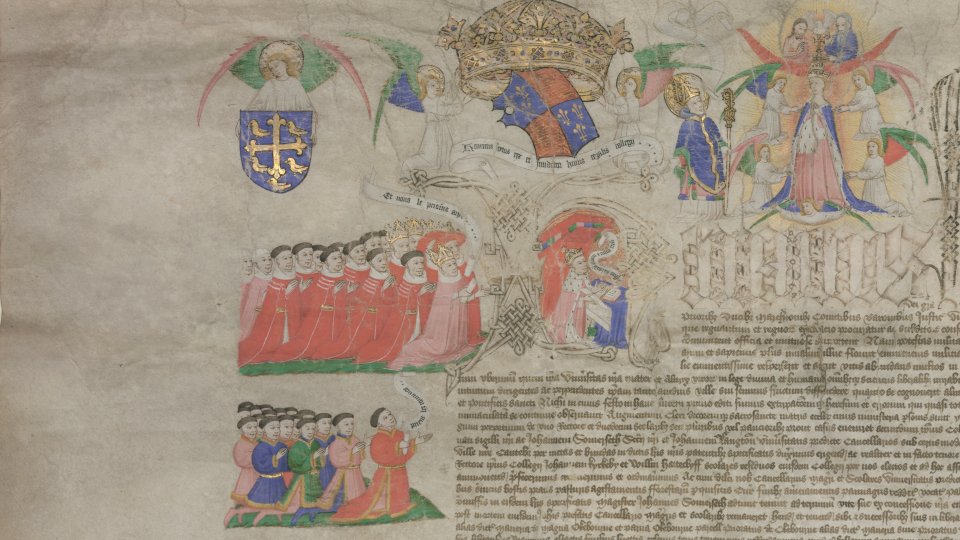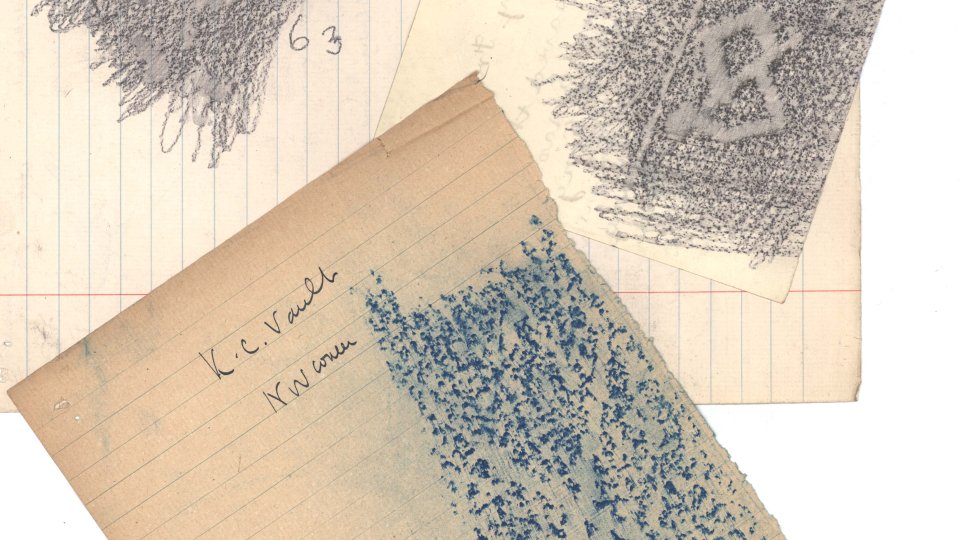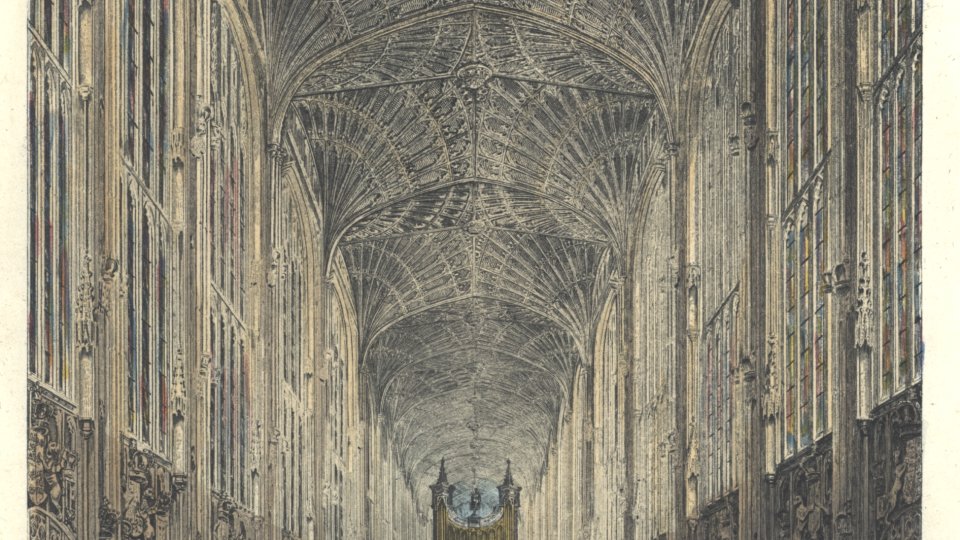
John Baker and his brother Philip were fellows of King's during the reigns of King Edward VI (1547-53) and Queen Mary I (1553-58). Philip Baker became Provost at the beginning of the reign of Elizabeth I, in 1558, three years after John's death. Philip is a major figure in the history of College in the sixteenth century, famously leaving his provostship – and the country – in 1570 because of his Catholic sympathies. But it is the life of John Baker, rather than that of his brother, which represents the starting point for this exploration of the biographical and historical possibilities of College Archives.
The Bakers lived in a period of unprecedented political and religious change, which, although often conceived of in terms of national law and governance, profoundly affected the subjects of the crown at a local level – this was certainly the case in the kingdom's two academic centres of Oxford and Cambridge. During the reign of King Edward VI, King's became a flagship of Protestant Reformation. The Chapel was already an established and potent symbol of Tudor authority, and the College's Provost from 1548, John Cheke, was a tutor to the king and a man at the cutting edge of English humanism and evangelical reformation. Cheke's admission as Provost – and his impressive annual stipend of £100 – were marks of royal favour for Cheke and King's. The College Archive's Protocollum Book for the period records Cheke's formal admission and offers a clear statement of mission and allegiance: it records that nothing in the election bound the new Provost 'contrary to the trewe doctryne of the Church of England' or stood 'contrariouse to such facultye liberte or licence as the Kynges highnes alredy hath gyven me or herafter shall of his Kynglye power gyve me'.
John Baker played a small but historically recordable part in these national events. In 1551 he contributed classical verse to a volume, edited by Cheke, celebrating the life of the German Protestant reformer Martin Bucer. A later account of Bucer's funeral in Cambridge described how men proficient in Latin and Greek 'set up some Verses … upon the walles of the church' of St Mary the Great. John Baker may well have been one of these men, but, if he was at St Mary's in 1551, he was not the most senior member of King's present. The Latin oration on Bucer was given by Walter Haddon, one of the most senior fellows of King's in the reign of Edward VI, a distinguished civil lawyer, a Latinist of considerable reputation, and later master of Trinity Hall, Cambridge and president of Magdalen College, Oxford.
Some of the most important events in John Baker's life and academic career survive in the archives of the College, from his admission as an undergraduate in 1545 to the full text of his will, proved ten years later by Provost Atkinson. These documents offer a sense of the rhythm of college life in the middle decade of the sixteenth century, with its ordered progression from undergraduate study to the responsibilities of teaching. They also offer a remarkable insight into the material culture of Cambridge in the middle decade of the sixteenth century. Baker's will – with its virginals, gowns, gaberdine coat, and the names of his pupils – is a fascinating social document.
The Protocollum Book records the admission of John Baker as an undergraduate on 14 August 1545 in the thirty-seventh year of the reign of Henry VIII, by the grace of God king of England, France, and Ireland, defender of the faith, supreme head of the churches of England and Ireland. The names of the new students – Baker was one of eight – are noted in the left-hand margin, but the details of their age, place of birth, and diocese are recorded in the main body of the text. John Baker was eighteen years of age, born in Ilfracombe in the county of Devon and in the diocese of Exeter. His contemporaries range in age from sixteen (William Symcott of London) to eighteen. They are a geographically diverse group from counties as far apart as Shropshire and Norfolk, Dorset and Essex, and Cheshire and Middlesex.
Baker's admission as a Fellow of King's on 15 August 1548 – at the age of twenty-one, three years and a day after his undergraduate entry – is recorded in identical format later in the Protocollum Book. Some scholars chose not to proceed to a fellowship: here, in 1548, William Daye, William Temple, Nicholas Carvil, and George White joined Baker as a senior member of the College but the names of William Symcott, William Danyell, and Robert Ravell are missing.
The Commons Books in the College Archives are valuable social and biographical documents. They record the amount and cost of food consumed by members of King's from the most senior in Hall – the Vice-Provost – to the Choristers. They also help to mark attendance, and it is possible to say with some precision who was in College and when. All members of College had a commons allowance, and Fellows of mid-level seniority took turns book-keeping the dining expenses. These pages show a week in which Baker was steward - the second week after Christmas 1549/50. (Baker's name as steward is last on the second line on the top left of the first page.) First there is a list of those dining during the week - Philip Baker is the 21st on the list, and John Baker together with his contemporaries William Daye, William Temple, Nicholas Carvil, and George White are listed beginning 8 lines below that. The value of foods consumed is listed beginning in the block at the bottom right starting with milk, butter, eggs, and haddock. The list goes on for the following two pages, following by a sum of expenditure and the amounts of food left in store.
For more information on the Commons Books see the 'Pottecarie's Bill' blog linked to below.
The accounts of the bursar (the Mundum Books, so-called because they relate to mundane, everyday things) record the quarterly stipends paid to the Fellows and Scholars of the College (Provost and Vice Provost listed first with the others following in order of seniority, followed by lay clerks, Choristers sometimes named individually, and servants), as well as their clothing allowance, payments for extra duties such as being bursar or teaching the choristers, and payments to those in holy orders for saying prayers. They are an extremely important source of information about the College particularly in its first few centuries. The first image shows the account of the salaries paid on the feast of St John the Baptist, 24 June 1553. John Baker (on the ninth line up from the foot of the page) appears with a seniority level of Master. His basic stipend was 10 shillings, but the subsequent lines record that he was also paid 5 shillings as a dean of arts, 15 shillings for his teaching duties, and 10 shillings for his lectureship in Greek. At this time, Philip Baker (line 17 from the top) was the College's second bursar, a responsibility for which – like his brother's Greek lectureship – he received 10 shillings (as the next line records). The second image shows the two Bakers receiving their clothing allowance - Baker min[or] had a 30 shilling allowance and Baker sen[ior] had 34 shillings (in lines 9 and 8 from the bottom). The third image has several entries where Philip was reimbursed for his travel expenses while attending to College business as Bursar (sometimes with the Provost), and the fourth image is a summary record of John serving as steward in the Hall during the summer of 1550.
This is the full text of the will of John Baker, Master of Arts and Fellow, drafted on 14 November 1554. The court of the Vice-Chancellor could prove the wills of members and servants of the University; so could King's, and their texts were recorded in the College Ledger Books. Baker's will was proved on 10 April 1555 by Provost Richard Atkynson, professor of theology – the text squeezed in at the foot of the page.
John Baker's will is a remarkable document. It reveals the close relationships he had formed with his pupils – particularly William Wendover, Thomas Preston, and Christopher Tomson – and the two fellows he nominated as his witnesses: William Lodge (the first bursar) and Thomas Lewes. The will also presents the material dimensions of Baker's life, although it may not have been exhaustive because inventories of goods prepared for probate are separate historical documents and often longer than testaments. Still, Baker's will reveals his musical interests – he proposed to leave his virginals to his brother Philip – and his collection of gowns, hoods, coats, bed, and bolsters. It records the name of his nurse (Jane Boyer) and suggests that he had lost contact with his second brother Richard. And of course it confronts the future of his body after death, and Baker's chosen resting place: the College Chapel, the focus of a community defined by its commitment to learning and religion.
Testamentum Master Baker
In dei nomine Amen. I Jhon Baker beynge hoole of mynd but sycke of bodye make this my last wyll & Testament in fowrme folowynge ffyrst I betake & bequeythe my sowle to allmyghtye God the maker of yt & of all the world to be preserved for euerlastynge Lyffe as my assured hoope ys in hym throughe the merytes & precyous death of his onlye Sonne & our onlye Savyour Iesu Chryst, who dyed for the hoole world to saue all men[.] As for my bodye I wold yt shuld be buryed within the Chapell of the kynges Colledge of our ladye & saynct Nycholas yf yt shalbe so thought good to Master Provost elles wher yt shall pleace hym And yf yt be within the Chapell I bequeyth vj s viij d for the Churche vse Secundlye I bequeyth to my brother Philippe my vyrgynalles & my ffetherbedd & my blacke turkey ffrocke Item I bequeyth to my brother Rychard yf he be alyue my turkey ffrocke of Rattes Colowr, my wynter gaberdeyne faced with fytches & xs in monye. Item I bequeth to sir browne my best gowne & my hoode Item to Jane Boyer for her paynes taken with me in my sycknes tyme my better bowlster a payre of sheetes & x s in monye Item to Wendouer my better surplyse my blacke coote & a Regent hoode Item to sir browne my Regent coope & the other hoode Item to preston my pyllow & my best cappe Item to Coost the Clarke my fflocke bedd & a payre of sheetes Item my felt hatte to sir Thomas Pannot, my taffata hatte to Wendouer Item to Thomas boyer my ffreece coote & my ffrocke Item to Crosse the clarke a couerlette & my secunde bowlster Item I will desyre my brother Philippe to paye Tatam that I owe hym for me & my pupylls as yt appereth by a byll in my studye & to recken with my pupylls as my cowntynge booke declareth Also I haue ij angelles in my deske which my brother Philippe gaue to the companye I will I wyll them to be restored to the companye agayn Item my bookes I wyll my brother Philippe to bestowe them vppon sir browne, Wendouer, Preston, Tomson & other pore scholers as he shall thynke good, except he hym sellf wyll haue sume of them. Item my bowe & shaftes to my brother Rycharde. Item I owe Master Holland viijd for ij shaftes which I wyll to be payd vnto hym Item my Russell Cassocke to my brother Philippe my better dublet & my secunde cappe to Wendouer my secund dublet to Preston Item my deske in my studye I bequeth to Wendouer. Also I wyll ther be dealt to the poore xs of all my goodes & stuffe. I wyll my brother Philippe to bestow as he thynketh best. Wytnesses wherof are Master W Lodge & Master Thomas Lewes felows of the kynges colledge above mencyoned.



